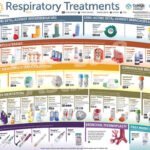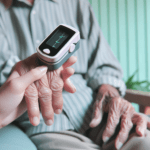In this article, we will explore the crucial role of respiratory therapy in adapting to the specific needs of elderly patients with chronic conditions. As we age, our respiratory system undergoes natural changes, making it susceptible to various health challenges. With a focus on providing personalized care and support, respiratory therapists play a vital role in helping elderly patients manage their chronic conditions and improve their quality of life. By understanding the unique challenges faced by these patients and employing specialized techniques and treatments, respiratory therapy ensures that every breath counts for our elderly loved ones.

Overview of respiratory therapy
Definition and purpose of respiratory therapy
Respiratory therapy is a specialized healthcare profession that focuses on the management and treatment of respiratory conditions. It involves various techniques and interventions aimed at improving respiratory function and quality of life for patients. The primary purpose of respiratory therapy is to assist individuals in maintaining optimal respiratory health, particularly those with chronic conditions.
Types of respiratory therapy techniques
There are several techniques employed in respiratory therapy to address different respiratory conditions. These techniques include:
Oxygen therapy: This involves the administration of supplemental oxygen to patients with low oxygen levels in their blood. It can be delivered through nasal prongs, masks, or ventilators.
Chest physiotherapy: This technique is used to improve lung function by promoting the clearance of mucus and secretions. It includes techniques such as percussion, vibration, and postural drainage.
Breathing exercises: Respiratory therapists teach patients various breathing exercises aimed at improving lung capacity and promoting proper inhalation and exhalation.
Inhalation therapy: This technique involves the use of medications delivered directly into the lungs via inhalers, nebulizers, or other devices. It helps manage conditions such as asthma, chronic obstructive pulmonary disease (COPD), and cystic fibrosis.
Importance of respiratory therapy for elderly patients with chronic conditions
Respiratory therapy plays a crucial role in the overall well-being of elderly patients with chronic respiratory conditions. As individuals age, respiratory function naturally declines, and they become more susceptible to respiratory illnesses and diseases. For elderly patients with chronic conditions such as COPD, asthma, or pneumonia, respiratory therapy offers essential support in managing and improving their respiratory health. It helps alleviate symptoms, enhances lung function, reduces hospitalizations, and improves their overall quality of life.
Underlying chronic respiratory conditions in the elderly
Common chronic respiratory conditions in elderly patients
Elderly patients commonly experience chronic respiratory conditions that significantly impact their respiratory function. Some of these conditions include:
Chronic Obstructive Pulmonary Disease (COPD): COPD is a progressive lung disease characterized by airflow limitation, often caused by chronic bronchitis or emphysema. It is commonly seen in elderly individuals with a history of smoking or long-term exposure to environmental pollutants.
Asthma: Asthma is a chronic inflammatory condition of the airways, resulting in recurring episodes of wheezing, breathlessness, chest tightness, and coughing. Elderly patients can develop asthma later in life or continue to experience symptoms from childhood.
Pneumonia: Pneumonia is an infection that causes inflammation in the air sacs of the lungs. Elderly individuals are particularly vulnerable to pneumonia due to weakened immune systems and impaired respiratory defenses.
Effects of chronic respiratory conditions on the elderly
Chronic respiratory conditions can have significant effects on the overall well-being of elderly patients. They may experience symptoms such as shortness of breath, persistent coughing, chest discomfort, fatigue, and reduced exercise tolerance. These symptoms can limit their ability to perform daily activities, decrease their quality of life, and increase the risk of complications such as respiratory infections.
Impact of chronic conditions on respiratory therapy
Chronic respiratory conditions present unique challenges in respiratory therapy for elderly patients. These individuals often require long-term management and support to prevent exacerbations and maintain stable respiratory function. Respiratory therapists must tailor their approaches and techniques to address the specific needs and limitations of elderly patients with chronic conditions.

Adaptations in respiratory therapy for elderly patients
Assessment and evaluation of elderly patients
When working with elderly patients, respiratory therapists must conduct thorough assessments and evaluations to gain a comprehensive understanding of their medical history, current respiratory status, and any coexisting conditions. This information helps guide the development of personalized care plans and the selection of appropriate treatment modalities.
Modifications in treatment plans
Treatment plans for elderly patients with chronic respiratory conditions may require modifications to cater to their unique needs. This may include adjusting medication dosages, considering potential drug interactions, or incorporating alternative therapies to reduce the risk of adverse effects.
Adjustments in medication management
Elderly patients often have multiple medications to manage various health conditions. Respiratory therapists play a crucial role in coordinating medication management and ensuring proper adherence to prescribed treatments. They may educate patients on the correct use of inhalers or nebulizers, monitor medication effectiveness, and collaborate with healthcare providers to optimize drug therapy.
Use of specialized respiratory equipment for the elderly
Elderly patients may require specialized respiratory equipment to facilitate their respiratory therapy. This can include devices such as lightweight portable oxygen concentrators, user-friendly inhalers, or nebulizers with built-in timers and alarms. The use of appropriate equipment enhances convenience, improves compliance, and promotes independent management of respiratory conditions.
Incorporating exercises and physical therapy
Physical activity plays a crucial role in maintaining respiratory health for elderly patients. Respiratory therapists may incorporate exercises and physical therapy techniques tailored to the individual’s abilities and limitations. These exercises aim to improve lung capacity, muscle strength, and overall physical fitness.
Educating and training elderly patients on self-care
Respiratory therapists take on the role of educators, providing elderly patients with the knowledge and skills necessary for effective self-care. This includes teaching proper inhalation techniques, educating on symptom recognition, and empowering patients to manage their respiratory conditions independently. Patient education promotes self-confidence and empowers elderly individuals to actively participate in their respiratory therapy.
Developing personalized care plans
Consideration of individual medical history and condition
To ensure effective respiratory therapy for elderly patients, personalized care plans should consider each patient’s unique medical history, pre-existing conditions, and individual needs. This comprehensive approach helps address underlying health issues and tailors treatment strategies accordingly.
Collaboration with other healthcare professionals
Respiratory therapists often collaborate with a multidisciplinary team of healthcare professionals to ensure coordinated care for elderly patients with chronic respiratory conditions. This collaboration may involve pulmonologists, geriatricians, nurses, physical therapists, and occupational therapists. Working together ensures that all aspects of the patient’s care are addressed holistically.
Integration of patient preferences and goals
Respiratory therapy should always incorporate the patient’s preferences and goals into the care plan. Engaging patients in shared decision-making processes empowers them to actively participate in their own treatment and promotes a patient-centered approach.
Regular evaluations and modifications
Care plans for elderly patients with chronic respiratory conditions should be regularly evaluated and modified as needed. Regular assessments help monitor treatment effectiveness, adapt to changes in the patient’s condition, and make necessary adjustments to optimize respiratory therapy outcomes.

Psychological and emotional support
Addressing anxiety and depression in elderly patients
Elderly patients with chronic respiratory conditions are susceptible to anxiety and depression due to the challenges associated with their conditions. Respiratory therapists can provide psychological support by addressing feelings of fear, anxiety, and sadness. They may refer patients to mental health professionals when necessary and provide coping strategies to manage emotional well-being.
Supporting patients with limited mobility or independence
Some elderly patients may have limited mobility or require assistance with daily activities. Respiratory therapists can assist in ensuring their safety and comfort by educating them and their caregivers on proper positioning, mobility aids, and techniques to conserve energy during respiratory therapy sessions.
Counseling and therapy for psychological well-being
Respiratory therapists may offer counseling or therapy services aimed at improving the psychological well-being of elderly patients. This may involve relaxation techniques, stress management strategies, and providing a supportive environment to express concerns and fears. Psychological well-being is integral to the overall success of respiratory therapy in elderly patients.
Ensuring safety and comfort
Monitoring for adverse reactions or side effects
During respiratory therapy sessions, respiratory therapists closely monitor elderly patients for any adverse reactions or side effects. This includes observing for signs of respiratory distress, allergic reactions, or discomfort. Prompt identification and appropriate management of adverse events ensure the safety and well-being of the patient.
Creating a conducive environment for treatment
Respiratory therapy sessions should take place in a comfortable and conducive environment. For elderly patients, this may involve adjusting room temperature, ensuring proper lighting, and equipping the space with necessary respiratory equipment and supplies. Creating a welcoming and relaxing atmosphere promotes patient satisfaction and compliance.
Assistance with mobility and positioning
Elderly patients with chronic respiratory conditions may require assistance with mobility and positioning during respiratory therapy. Respiratory therapists should collaborate with other healthcare professionals to address these needs. They can recommend appropriate mobility aids, provide instruction on safe transfers and positioning techniques, and offer guidance on exercises to improve strength and mobility.
Preventing infections and respiratory complications
Respiratory therapists play a vital role in preventing respiratory infections and complications. They educate patients on proper hand hygiene, respiratory etiquette, and infection control measures. Additionally, vaccination recommendations are shared to ensure elderly individuals are protected against preventable respiratory illnesses such as influenza and pneumonia.
Communication and family involvement
Effective communication strategies with elderly patients
When communicating with elderly patients, respiratory therapists should adopt strategies to enhance comprehension and engagement. This may include using clear and concise language, providing written materials or visual aids, and allowing sufficient time for patients to ask questions or express concerns. Effective communication fosters trust and patient satisfaction.
Engaging and involving family members
Family members often play a significant role in the care of elderly patients with chronic respiratory conditions. Respiratory therapists should engage and involve family members in the treatment process to promote a holistic approach. Involving family members in training, education, and decision-making processes helps ensure consistent support and continuity of care.
Building a support network for the patient
Respiratory therapists can assist in building a support network for elderly patients by connecting them with community resources, support groups, or other individuals with similar respiratory conditions. This network provides additional emotional support, educates patients and their families, and encourages the exchange of experiences and coping strategies.
Addressing challenges and limitations
Dealing with cognitive impairments or dementia
Elderly patients with chronic respiratory conditions may also have cognitive impairments or dementia, which can present unique challenges in respiratory therapy. Respiratory therapists must adapt their communication methods, simplify instructions, and involve caregivers or family members in supporting the patient’s adherence to therapy.
Overcoming physical limitations and frailty
Physical limitations and frailty are common challenges faced by elderly patients. Respiratory therapists can help overcome these limitations by tailoring treatment plans to the patient’s abilities and providing assistive devices or techniques to facilitate therapy. Additionally, incorporating strength and balance exercises can improve physical function and reduce the risk of falls.
Considering financial constraints
Financial constraints may impact the accessibility of respiratory therapy for elderly patients. Respiratory therapists should be aware of available resources, such as government assistance programs or insurance coverage, and guide patients and their families towards financial support options. This ensures that elderly patients receive the necessary respiratory care without experiencing undue financial burden.
Transportation and accessibility issues
Elderly patients may face transportation and accessibility challenges, especially when attending respiratory therapy sessions. Respiratory therapists can collaborate with healthcare organizations and community resources to provide transportation services or explore telehealth options. By addressing these barriers, respiratory therapy becomes more accessible and convenient for elderly patients with chronic respiratory conditions.
Integration of technology in respiratory therapy
Advancements in respiratory therapy technology
Advancements in technology have significantly influenced respiratory therapy for elderly patients with chronic conditions. Innovative devices and equipment, such as portable oxygen concentrators, smart inhalers, and telemonitoring systems, enhance the delivery of care and improve patient outcomes. These technological advancements enable respiratory therapists to monitor patients remotely, track their progress, and provide real-time feedback and support.
Remote monitoring and telehealth services
Remote monitoring and telehealth services have revolutionized respiratory therapy for elderly patients with chronic conditions. Respiratory therapists can remotely assess vital signs, monitor medication adherence, and provide ongoing support and education. Telehealth allows for virtual consultations, reducing the need for frequent in-person visits and enhancing convenience for elderly patients.
Assistive devices and apps for self-management
Assistive devices and mobile applications (apps) have become valuable tools for elderly patients in managing their respiratory conditions. Respiratory therapists can recommend and educate patients on the use of assistive devices such as pulse oximeters, peak flow meters, and breathing trainers. Additionally, smartphone apps can help patients track symptoms, monitor medication usage, and provide reminders for therapy sessions.
Research and future directions
Current research on respiratory therapy for elderly patients
Ongoing research in respiratory therapy for elderly patients focuses on improving treatment outcomes and optimizing care delivery. Studies are exploring the efficacy of new interventions, assessing the impact of personalized care plans, and investigating the effectiveness of telehealth services. The goal is to continually enhance respiratory therapy approaches to better meet the unique needs of elderly patients with chronic respiratory conditions.
Emerging trends in managing chronic respiratory conditions
Emerging trends in managing chronic respiratory conditions among the elderly include a shift towards patient-centered care, greater emphasis on self-management education, and increased integration of technology. These trends aim to empower elderly patients, improve treatment adherence, and enhance overall respiratory health outcomes.
Potential areas of improvement in respiratory therapy
Respiratory therapy for elderly patients with chronic conditions has come a long way, but there are areas that still require improvement. These include further research into non-pharmacological interventions, development of personalized algorithms for treatment selection, and increased awareness and access to respiratory therapy services among elderly populations. By addressing these areas, respiratory therapy can continue to evolve and provide better care for elderly patients with chronic respiratory conditions.
In conclusion, respiratory therapy plays a critical role in adapting to the unique needs of elderly patients with chronic respiratory conditions. From personalized care plans to psychological support, respiratory therapists employ a range of techniques and strategies to enhance the respiratory health and overall well-being of elderly individuals. By continuously evolving and integrating technology, respiratory therapy has the potential to further improve outcomes and transform the care provided to elderly patients with chronic respiratory conditions.









